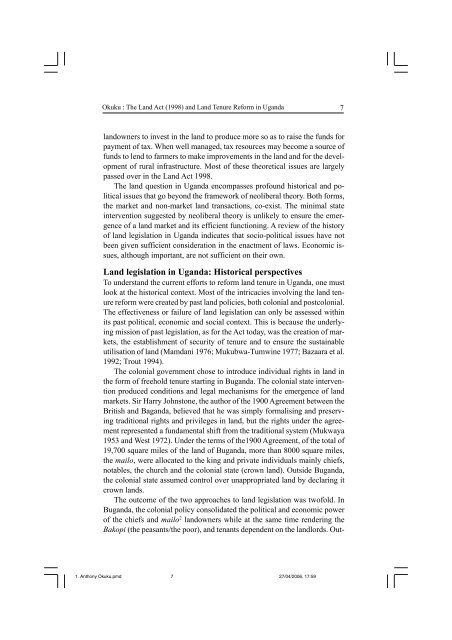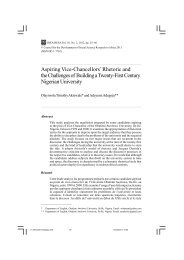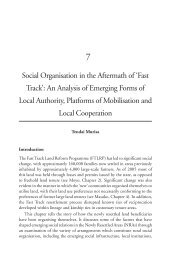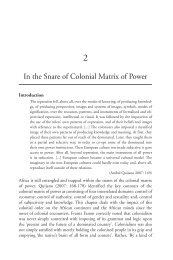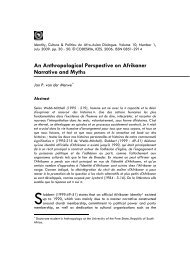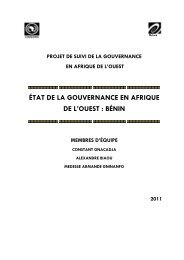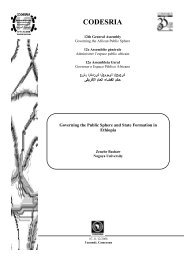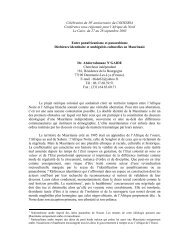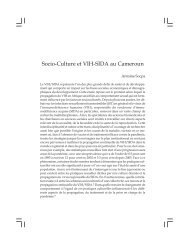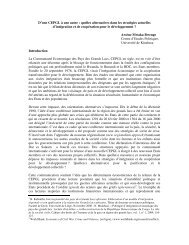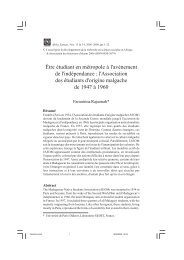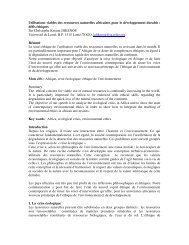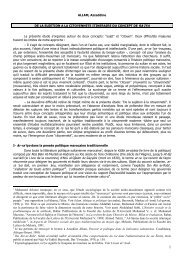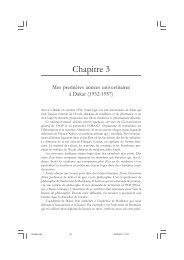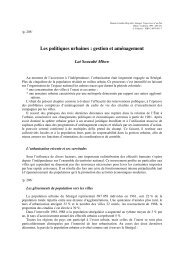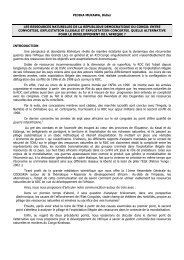and Land Tenure Reform in Uganda - codesria
and Land Tenure Reform in Uganda - codesria
and Land Tenure Reform in Uganda - codesria
You also want an ePaper? Increase the reach of your titles
YUMPU automatically turns print PDFs into web optimized ePapers that Google loves.
Okuku : The L<strong>and</strong> Act (1998) <strong>and</strong> L<strong>and</strong> <strong>Tenure</strong> <strong>Reform</strong> <strong>in</strong> Ug<strong>and</strong>a<br />
l<strong>and</strong>owners to <strong>in</strong>vest <strong>in</strong> the l<strong>and</strong> to produce more so as to raise the funds for<br />
payment of tax. When well managed, tax resources may become a source of<br />
funds to lend to farmers to make improvements <strong>in</strong> the l<strong>and</strong> <strong>and</strong> for the development<br />
of rural <strong>in</strong>frastructure. Most of these theoretical issues are largely<br />
passed over <strong>in</strong> the L<strong>and</strong> Act 1998.<br />
The l<strong>and</strong> question <strong>in</strong> Ug<strong>and</strong>a encompasses profound historical <strong>and</strong> political<br />
issues that go beyond the framework of neoliberal theory. Both forms,<br />
the market <strong>and</strong> non-market l<strong>and</strong> transactions, co-exist. The m<strong>in</strong>imal state<br />
<strong>in</strong>tervention suggested by neoliberal theory is unlikely to ensure the emergence<br />
of a l<strong>and</strong> market <strong>and</strong> its efficient function<strong>in</strong>g. A review of the history<br />
of l<strong>and</strong> legislation <strong>in</strong> Ug<strong>and</strong>a <strong>in</strong>dicates that socio-political issues have not<br />
been given sufficient consideration <strong>in</strong> the enactment of laws. Economic issues,<br />
although important, are not sufficient on their own.<br />
L<strong>and</strong> legislation <strong>in</strong> Ug<strong>and</strong>a: Historical perspectives<br />
To underst<strong>and</strong> the current efforts to reform l<strong>and</strong> tenure <strong>in</strong> Ug<strong>and</strong>a, one must<br />
look at the historical context. Most of the <strong>in</strong>tricacies <strong>in</strong>volv<strong>in</strong>g the l<strong>and</strong> tenure<br />
reform were created by past l<strong>and</strong> policies, both colonial <strong>and</strong> postcolonial.<br />
The effectiveness or failure of l<strong>and</strong> legislation can only be assessed with<strong>in</strong><br />
its past political, economic <strong>and</strong> social context. This is because the underly<strong>in</strong>g<br />
mission of past legislation, as for the Act today, was the creation of markets,<br />
the establishment of security of tenure <strong>and</strong> to ensure the susta<strong>in</strong>able<br />
utilisation of l<strong>and</strong> (Mamdani 1976; Mukubwa-Tumw<strong>in</strong>e 1977; Bazaara et al.<br />
1992; Trout 1994).<br />
The colonial government chose to <strong>in</strong>troduce <strong>in</strong>dividual rights <strong>in</strong> l<strong>and</strong> <strong>in</strong><br />
the form of freehold tenure start<strong>in</strong>g <strong>in</strong> Bug<strong>and</strong>a. The colonial state <strong>in</strong>tervention<br />
produced conditions <strong>and</strong> legal mechanisms for the emergence of l<strong>and</strong><br />
markets. Sir Harry Johnstone, the author of the 1900 Agreement between the<br />
British <strong>and</strong> Bag<strong>and</strong>a, believed that he was simply formalis<strong>in</strong>g <strong>and</strong> preserv<strong>in</strong>g<br />
traditional rights <strong>and</strong> privileges <strong>in</strong> l<strong>and</strong>, but the rights under the agreement<br />
represented a fundamental shift from the traditional system (Mukwaya<br />
1953 <strong>and</strong> West 1972). Under the terms of the1900 Agreement, of the total of<br />
19,700 square miles of the l<strong>and</strong> of Bug<strong>and</strong>a, more than 8000 square miles,<br />
the mailo, were allocated to the k<strong>in</strong>g <strong>and</strong> private <strong>in</strong>dividuals ma<strong>in</strong>ly chiefs,<br />
notables, the church <strong>and</strong> the colonial state (crown l<strong>and</strong>). Outside Bug<strong>and</strong>a,<br />
the colonial state assumed control over unappropriated l<strong>and</strong> by declar<strong>in</strong>g it<br />
crown l<strong>and</strong>s.<br />
The outcome of the two approaches to l<strong>and</strong> legislation was twofold. In<br />
Bug<strong>and</strong>a, the colonial policy consolidated the political <strong>and</strong> economic power<br />
of the chiefs <strong>and</strong> mailo 2 l<strong>and</strong>owners while at the same time render<strong>in</strong>g the<br />
Bakopi (the peasants/the poor), <strong>and</strong> tenants dependent on the l<strong>and</strong>lords. Out-<br />
1. Anthony Okuku.pmd 7<br />
27/04/2006, 17:59<br />
7


